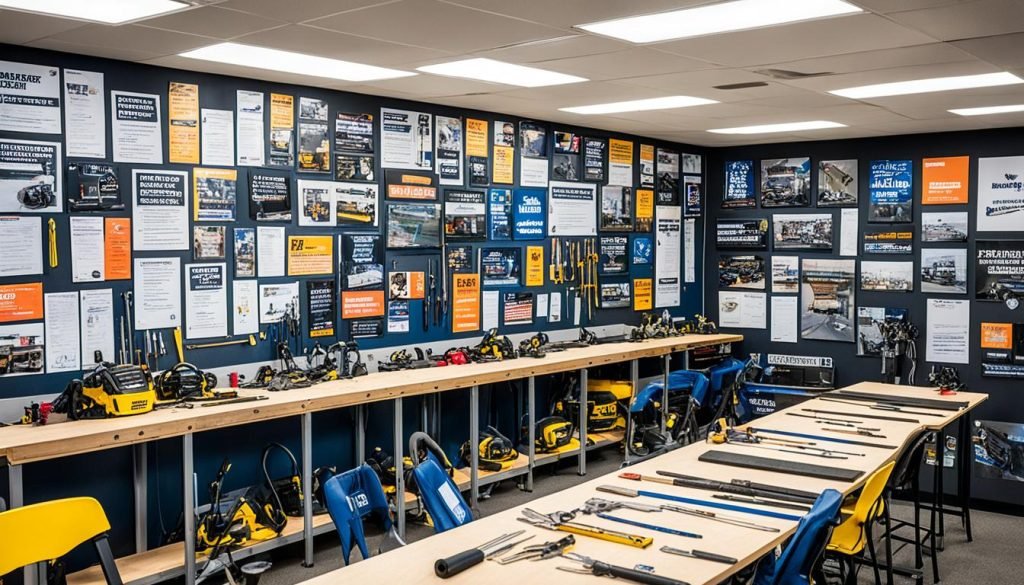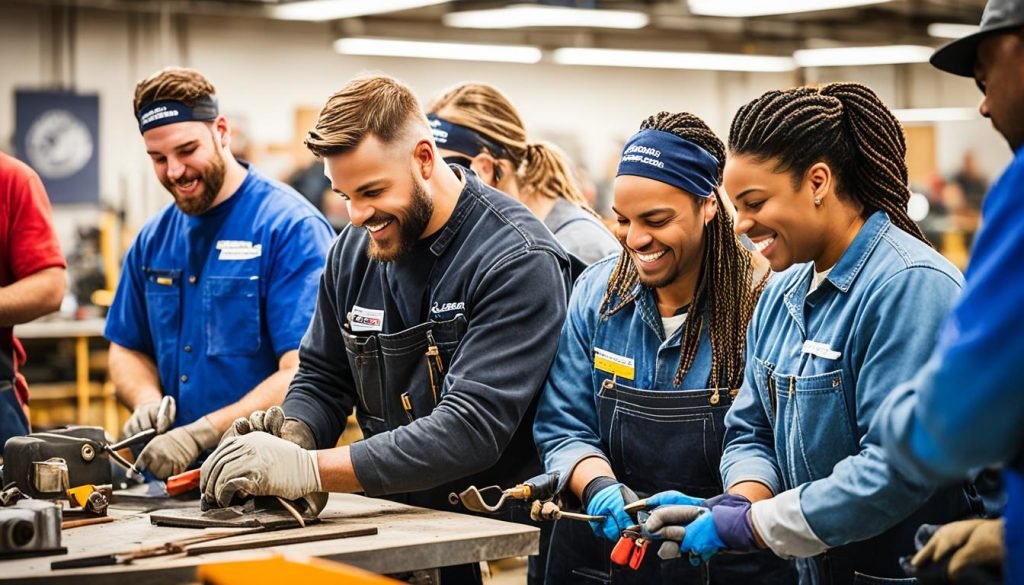Vocational education programs help students learn the skills they need to succeed in different careers. They give students many chances to find the right career path and get ready for work. Students learn how to make great resumes and ace interviews. They also learn how to work well with others and adjust to new jobs. These programs follow what the job market needs and can get students certifications.
Key Takeaways:
- Vocational education programs equip students with the necessary skills for success in various career fields.
- These programs offer hands-on learning opportunities to prepare students for the workforce.
- Students develop essential job search skills and career-ready skills through vocational education programs.
- Vocational education programs often meet industry standards and may lead to industry-recognized certifications.
- Exploring different career paths and opportunities is a key aspect of vocational education programs.
Benefits of Vocational Education Programs
Vocational education programs have many pluses for students. They offer hands-on training that really matters in jobs. Students learn skills in business, healthcare, IT, or manufacturing.
“Vocational education programs give students the opportunity to learn by doing, which is essential in acquiring the necessary technical skills and competencies for future employment.” – Jessica Thompson, Career Development Expert
They help students find what they’re good at and what they like. This leads to a clearer career path and matches personal goals. Vocational training lets students dive deep into their interest areas.
It gives them the needed tech education to move up in their careers.
The Benefits of Vocational Education Programs
Let’s look at why vocational programs matter:
- Development of practical skills that are directly applicable in the workforce.
- Specialization in specific fields such as business, healthcare, IT, and manufacturing.
- Exploration of different career paths to find the right one.
- Boosting job skills and career prospects.
- They help you start college ahead.
These programs can also get you ahead in college. You can earn college credit while in high school. It saves time and money on your degree or certificate.
Overall, vocational programs prepare students well for their careers. They mix hands-on work, career exploration, and college options. This helps students succeed in the working world.
Vocational Education Programs in Michigan
Michigan focuses on the role of vocational education in meeting job needs. Career and Technical Education (CTE) programs help high school and college students. They get hands-on learning in areas like business, healthcare, and manufacturing. These skills can lead to good jobs or further study.
“CTE programs in Michigan provide students with the practical skills and knowledge needed to thrive in the workforce,” says Jane Thompson, Director of Vocational Education at the Michigan Department of Education. “With the ever-changing job landscape, vocational education equips students with the necessary trade skills to secure employment and contribute to the state’s economic growth.”
Much of Michigan’s vocational education goes beyond standard schooling. Early Middle Colleges (EMCs) are a unique example. High schoolers here can earn college credits and even degrees before they graduate. This helps them jump-start their careers.
Michigan’s vocational education also involves experts from different industries. They make sure students learn the latest skills. Programs offer real-world training and chances for internships and apprenticeships. These opportunities boost students’ job readiness.
Michigan sees vocational education as key to growing a strong workforce. The state supports vocational programs to meet both local and national job needs. This effort shows Michigan’s commitment to preparing students for successful careers.

Trade Schools in Michigan
Michigan has a vast array of trade schools for focused vocational training. These schools are in fields like healthcare, technical trades, culinary arts, and cosmetology. They provide a direct path to learning specific job skills. This makes graduates ready for work quickly and with confidence.
| Trade School | Location | Programs Offered |
|---|---|---|
| Michigan Technical Institute | Lansing | Automotive Technology, HVAC-R Technician, Welding Technician |
| Dorsey Schools | Madison Heights | Medical Assisting, Culinary Arts, Cosmetology |
| Great Lakes Culinary Institute | Traverse City | Culinary Management, Baking & Pastry Arts, Wine & Beverage Management |
| Midwest Technical Institute | Canton | CDL Training, HVAC/R-MAR Technician, Welding Technology |
Trade schools in Michigan offer certificates that are respected in the industry. They also help place students in jobs. These schools focus on practical skills. They help students succeed in their chosen fields.
Resources and Materials for Vocational Education Programs
Vocational education programs use many resources to support their students. These resources help students learn better. They include textbooks, hands-on activities, and good teaching methods.
Textbooks and Student Activity Manuals
Textbooks and student activity books are key for learning. They cover many topics relevant to vocational studies. With fun activities and clear lessons, they build a strong base for students.
Teacher Resources
Teachers need special resources to teach well in vocational schools. These include teacher’s guides, tests, and visuals. These resources help make lessons interesting and effective for students.
Digital Platforms and eText Access Code Cards
Technology is important in modern education, especially for vocational programs. Online platforms offer extra videos and tools. They make studying easy and fun, allowing students to learn anywhere.
Comparison of Vocational Schools
| School | Location | Programs Offered | Tuition Fees |
|---|---|---|---|
| ABC Technical Institute | New York City, NY | Electrical Engineering, HVAC Technician | $10,000 – $15,000 per year |
| XYZ Trade School | Los Angeles, CA | Automotive Technology, Welding | $12,000 – $18,000 per year |
| DEF Vocational College | Chicago, IL | Medical Assisting, Cosmetology | $8,500 – $13,000 per year |
| GHI Career Institute | Miami, FL | Culinary Arts, Graphic Design | $14,000 – $20,000 per year |
There are many vocational schools with different programs and costs. It’s important to compare them before choosing. This helps find the right school for your needs.
Vocational education uses special tools to help students succeed. These resources create a rich learning culture. They prepare students well for their future careers.

Conclusion
Vocational education programs help students gain the skills they need for jobs. These programs make students ready for work and more likely to get a job. They do this by giving students hands-on experience and practical lessons.
In the job world today, employers want workers with real skills and experience. Vocational programs teach students these needed skills. They help students find success in their careers and open many opportunities.
There’s a big demand for skilled workers. Vocational programs help meet this demand and boost the economy. By joining these programs, individuals can get the training they need for good jobs.
FAQ
What are vocational education programs?
What job search skills do vocational education programs teach?
What career-ready skills do vocational education programs help develop?
Do vocational education programs meet industry standards?
What are the benefits of vocational education programs?
What are CTE programs in Michigan?
What are Early Middle Colleges (EMCs) in Michigan?
What resources are available to support vocational education programs?
How do vocational education programs prepare students for success in their careers?
Source Links
- https://www.savvas.com/solutions/career-and-technical-education/career-clusters/human-services/programs/pathways-to-career-success/shop-now
- https://www.savvas.com/solutions/career-and-technical-education/career-clusters/human-services/programs/pathways-to-career-success
- https://www.michigan.gov/leo/news/2024/02/08/students-encouraged-to-explore-education-and-career-pathways-during-cte-month





